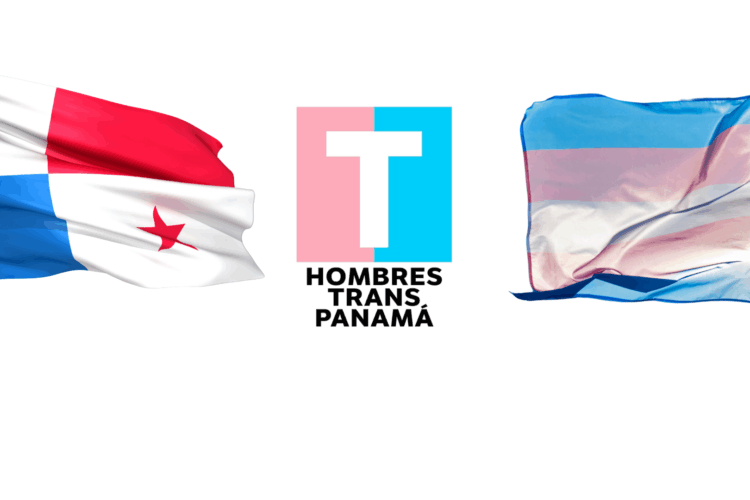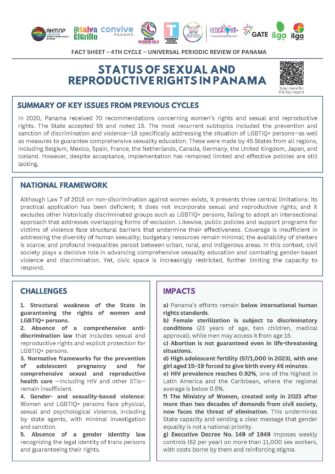Hombres Trans Panama, founded in 1996, is the first organization in Panama and Central America dedicated to defending the rights or LGBTQ+ communities, focusing on the promotion of health, HIV prevention, education and protection of human rights for sexual diversity.
In August 2025 a coalition composed by Hombres Trans Panamá (HTP), Asociación Hombres y Mujeres Nuevos de Panamá (AHMNP), Fundación CONVIVE Panamá, Asociación Wigudun Galu, Salva el Grillo, Asociación Trans Diversa (ATD), submitted recommendations concerning women’s rights and sexual and reproductive rights to the fourth cycle of the United Nations Universal Periodic Review with support from GATE, Red Americana de Hombres Trans y Personas Disidentes del Género Asignado F al Nacer, ILGALac e IlGA World.
Summary
Despite Panama government acceptance of previous 55 recommendations concerning women’s rights and sexual and reproductive rights,18 specifically addressing the situation of LGBTIQ+ persons, the implementation of such recommendations remained limited and effective policies are still lacking. Therefore, the following recommendations presented are essential to:
- improve practical implementation of laws on non-discrimination against women, ensuring sexual and reproductive rights are incorporated
- implement intersectional approaches that address overlapping forms of exclusion of LGBTIQ+
- ensure public policies and support programs for victims of violence address the diversity of human sexuality;
Some of the key issues and concerns for trans rights in Panama
Trans and gender diverse communities in Panama are facing key issues and concerns such as:
- Absence of a comprehensive anti-discrimination law that includes sexual and reproductive rights and explicit protection for LGBTIQ+ persons.
- Women and LGBTIQ+ persons face physical, sexual and psychological violence, including by state agents, with minimal investigation and sanction.
- Absence of a gender identity law recognizing the legal identity of trans persons and guaranteeing their rights.
- Exclusion from the labor market: LGBTIQ+ persons —especially trans women and sex workers— face discrimination and the stigmatization of their livelihoods.
Such challenges has impacted communities health access, human rights protections and gender equality, deepening poverty and social marginalization, reinforcing stigma, creating unsafe school environments leading to school dropout and increasing HIV prevalence rates. Below you’ll find the recommendations provided by the coalition to the fourth cycle of UN UPR.
Recommendations:
- Reform Law No. 7 of 2018 into a comprehensive anti-discrimination law, ensuring the inclusion of sexual and reproductive rights and effective legal protection for LGBTIQ+ persons in the full enjoyment of their economic, social and cultural rights. (By France (112), Mexico (113) and Italy (41))
- Eliminate discriminatory requirements for voluntary female sterilization and align conditions with those established for adult men, by 2026.
- Repeal Executive Decree of 1949 that imposes mandatory health checks on cis and trans women in certain occupations, by the end of 2026.
- Incorporate into the Penal Code the explicit classification of hate crimes motivated by SOGIESC, ensuring that bias motivation is recognized as an aggravating circumstance in sentencing, in order to enable effective investigation, prosecution and sanction.
- Guarantee an enabling environment for gender equality and the protection of LGBTIQ+ persons by: ensuring access to comprehensive sexuality education at all levels and maintaining and adequately resourcing the Ministry of Women as the national mechanism for equality.
- Establish an independent monitoring mechanism to oversee the implementation of UPR recommendations on sexual and reproductive rights, with the participation of civil society, including the preparation of mid-term public reports with disaggregated data.
Hombres Trans Panama is part of GATE Membership structure and received financial assistance from GATE to cover the fees associated with writing reports for submission to UN mechanisms (SDGs, UPR, Treaty bodies, and Special procedures). This funding can be used for costs related to data gathering, such as desk research, key informant interviews and consultant fees for report writing.
Download the full submission to the UPR






